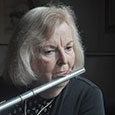Tokyo-born piccolo and flute player Natalie Schwaabe grew up in Hong Kong. She started her musical training there and was a member of the Hong Kong Junior Academy of Performing Arts. After completing her secondary education at the Purcell School in London, she obtained an artistic diploma with honors and a master degree while studying with Professor Paul Meisen at the Hochschule für Musik und Theater in Munich.
At the age of 21 she became principal flute of the Munich Symphony Orchestra and two years later joined the Munich Radio Orchestra. In 1996 she fulfilled a dream in becoming a member of the prestigious Symphony Orchestra of the Bavarian Radio, one of the world’s top ten orchestras. There she has worked with great conductors and musicians such as Sir Simon Rattle, Carlos Kleiber, Ricardo Muti, Mariss Jansons and Daniel Barenboim.
In 1996, she received the special prize of the jury at the Prague Spring International Music Competition and was also a prizewinner at the first International Carl Nielsen Flute Competition in 1998 in Odense, Denmark. In addition to orchestral playing, Schwaabe has appeared as a soloist with the Nürnberger Symphoniker and the Stuttgarter Chamber Orchestra among others. She especially enjoys playing chamber music with her wind quintet and the pianist Jan Philip Schulze.
Schwaabe is a passionate teacher and gives piccolo masterclasses worldwide. She teaches piccolo at the Hochschule für Musik und Theater in Munich where she lives with her husband, the violinist and composer Winfried Grabe and their 3 children.
What led you to select the flute?
Recently a school class of nine-year-olds visited our orchestral rehearsal and were allowed to come on stage beforehand. A group of girls timidly approached me wanting to know all about the flute and were totally enraptured by this beautiful instrument. I had to smile to myself as I was just the same. I desperately wanted to play in the orchestra at my new school. Since I had been playing piano up until then, I needed to start an orchestral instrument. My mother was totally against a string instrument, and my dad would have loved for me to play the clarinet, but that was just not pretty enough for me, it had to be the flute.
Where did you attend school in Hong Kong?
At first, I went to the German Swiss International School and then changed to Island School, an excellent English school, that offered many more extracurricular activities including an orchestra. My flute teacher was Laurel Ewell, a member of the Hong Kong Philharmonic who was originally from Seattle. Laurel, a student of Felix Skowronek (former principal flute of the Seattle Symphony), imbued in me a great love of music, orchestral playing, and a passion for the flute. I could not have had a better start. She was very patient, positive and methodical. She even gave me my first copy of Flute Talk. She managed to convince my parents to let their 13-year-old daughter travel half way across the world to visit Marrowstone Music Festival, a summer music camp near Seattle, where we made music all day. It was amazing, and I really enjoyed my time there. That is where I decided I wanted to be a musician and play in an orchestra when I grew up.
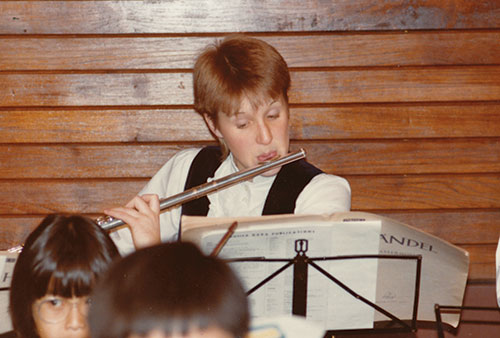
What were your undergraduate and graduate studies like?
After finishing my secondary education in London, I moved to Munich. Originally, I was planning to stay in London and study with Peter Lloyd at the Guildhall School of Music. I had a place there but Peter Lloyd was offered a professorship in the States, so I needed to find a new teacher. Tertiary education is free of charge in Germany and that was one of the reasons why my parents asked me to consider studying here. With Professor Paul Meisen I found a fantastic teacher at the Hochschule für Musik and Theater in Munich. He insisted on building solid foundations, especially concerning support and air flow. He felt that if your support (Stütze) is firmly rooted in your body everything will work naturally. So, I spent my first semester in Munich just doing very slow tone and support exercises. That was such a culture shock, as I was coming from an English-American tradition of practicing scales and technique at very high speeds. During my second term, I was finally allowed to play real pieces but at half the tempo, as my teacher insisted I practice slowly. Learning to practice slowly, while paying attention to every detail and analyzing the score as if looking at something under a microscope, was tremendously difficult but equally as rewarding. It really taught me how to learn and build up my technique and repertoire. Initially it took longer, but all the repertoire I learned in this way has rock solid foundations. It lets me build upon it, without having to start from scratch every time I go back to the music. I am thankful for this approach even though it took me quite a while to understand it.
My studies did aim for an orchestral career with emphasis on orchestral excerpts, literature, and Mozart concertos. I have always wanted to be an all-around musician, so I did a lot of everything while studying, such as playing a lot of chamber music (especially with harp) and immersing myself in different music styles. (I even played Bavarian folk music for a while.) I also played as many solo concertos as I could. I loved studying, taking music history, and piano lessons and having so much time to explore Munich and the area.
Munich is a beautiful city steeped in cultural tradition, so I went to the opera, attended numerous concerts and theater performances, and visited many of the wonderful museums. I find it really important to understand the background of each composer, the time they were living in, what was happening politically at the time, and what influenced them. Studying in Munich provided that nurturing background.
How many auditions did you take until you won your first job?
I was very lucky that I got a job after my first proper audition. My teacher suggested I do it just to get some experience. I had not even finished my diploma yet, but got the position and was plunged in at the deep end. The Münchner Symphoniker is a great little orchestra that plays all different styles of music from opera and operetta to film music and serious symphonic repertoire. It was a brilliant place to start a career. As principal flute, I gained experience and tried many different things without the pressure that comes in a bigger orchestra and especially a radio orchestra.
After that it became harder. I did many auditions, almost 25 I think. I found it very frustrating. It took time for me to understand the dynamics of an audition as they are so different from those of a concert. You receive so much more energy from an audience that has come to listen to a concert. In German auditions, orchestra members will listen to around 20 different musicians, all playing the same piece. It often is clear after the first few notes if the player might be what the orchestra is looking for. There is not really a flow of energy, so you have to create your own energy. I had to be completely prepared so that my nervousness and concentration lapses would not disturb my playing, and I had to tell myself that I was the right player for the job. Not the best but the right one, and that this orchestra needed to listen to me.
I speak a lot about auditions to my students. Not only about how to play the excerpts and set pieces but also how to prepare. For example, since you may have to wait for a long time, bring foods that will give you energy. Dress comfortably because high-heeled shoes can be difficult if you get nervous. I tell students to think about the audition time and how they play at that time of day. For example, if the audition is at 4 pm, and it is not your best time of day, change your daily schedule before the audition. You might eat lunch at 11 am and then take a small nap so that 4 pm feels as if it were a concert in the evening. We discuss how to stay focused at an audition which is really important since auditions can sometimes turn into social events. This can be distracting before you play. My advice here is to greet people you know, and tell them you will talk after the audition is over. Every audition and concert can be a dress rehearsal for the next, provided you learn from the experience.
In Germany, usually the whole orchestra listens to an audition. Every orchestra has a different history and tradition of sound and playing. This can be quite a challenge when you are preparing for an audition. My orchestra, the Symphony Orchestra of the Bavarian Radio, was founded in 1949 and was originally formed out of several string quartets and woodwind quintets. This meant that the musicians were strong individuals and expressive players. This tradition has continued, and we look for musicians who not only play beautifully but are also expressive individualists and great chamber music players. This is important for every position, even for a second trombone player or tutti string player. We want to be inspired by all orchestral members even if they are only playing a tiny solo.
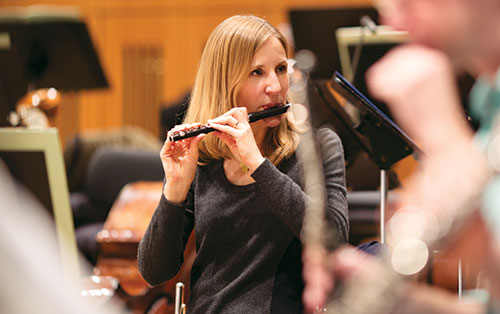
What is the focus of a radio orchestra?
A radio orchestra has many missions. As we are largely financed by a mandatory radio tax, paid by every household in Germany. We offer our radio, television and internet viewers and listeners a wide range of musical styles at the best quality possible. All of our concerts are for live audiences. We have several subscription concert series, five modern music concerts, a chamber music series, and some special concerts each season. Everything we perform, even on tour, is recorded and broadcast live on radio and on television. Livestreaming is becoming more and more popular, and we eventually plan to stream all of our concerts.
The orchestra’s education program is also a big part of our mission. This season I was on a school tour with our percussionists, and not only did I have to play Bolero on my flute, but I became an honorary member of the percussion group playing on boxes and tables using spoons. We gave ten concerts in schools all over Bavaria, having great fun with students, as they also took an active part in our performances.
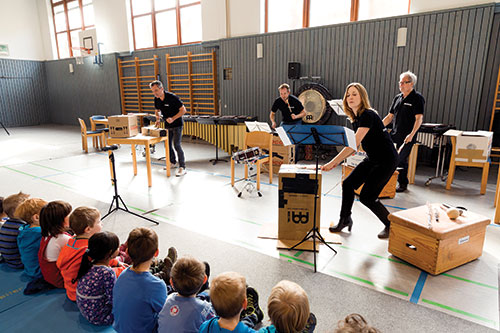
Performing on a recent school tour with the orchestra’s percussion section.
What is a typical week’s schedule?
No week is quite like the other. We have one to three concerts a week, depending on whether they are subscription concerts or a modern music concert. With the subscription concerts, the orchestra will rehearse from Monday to Wednesday, have a dress rehearsal on Thursday morning, and perform on Thursday, Friday and Saturday. I try to teach on Mondays after we have finished rehearsing and on Friday mornings. In addition, we are on tour for two to five weeks each season, although tours are rarely longer than two weeks.
What led you to making your recent recording, Piccolo Works?
Making a CD is special, especially as an orchestral musician. From a critical point of view, I could say that there are way too many recordings, and the market is saturated, but a piccolo colleague said to me “You have an obligation to make this CD for your students.” Fortunately, I had the opportunity to co-produce the CD with the Bavarian Radio. Nonetheless there were a few setbacks along the way, as my initial recording company closed down, and I had to find a new one just after all the recordings had been done.
When I was selecting the repertoire for this CD, I wanted to present a wide spectrum of beautiful pieces for the piccolo that showed what a wonderful chamber music instrument it can be. The piccolo has so many different colors to offer: witty, sad, angry, seductive, powerful, fragile. It is all there in this small instrument. Two of the works were written for me by dear friends, so I really wanted them to be on the recording. All of the repertoire apart from the Donatoni was composed in the 21st century, and that makes the recording even more vibrant for me.
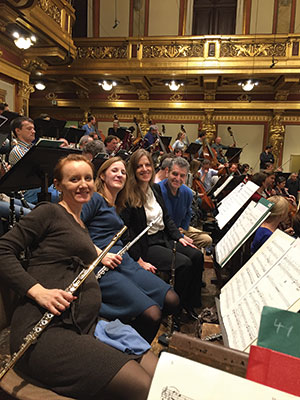
In Vienna at Musikverein, Schwaabe with Ivanna Ternay, Petra Schiessel and Philippe Boucly
What is your piccolo curriculum?
I teach piccolo to all of the flute majors at the Hochschule in Munich. They study flute with another teacher, and I am in charge of the piccolo side of things. Sometimes students will ask me to listen to their flute playing, especially concerning how to change from one instrument to the other, but mostly it is just piccolo. There are only 31 weeks in every school year, and the curriculum allows for everyone to have a weekly 30-minute lesson, so there is not that much time to spare.
Students come to me with varying levels and abilities. One might be working on repertoire, colors, and a beautiful sound in the upper register, while another just wants to get a decent sound out of the instrument. I find it fascinating to help all students fulfill their potential and believe that everybody can learn to play well.
Students have to keep in mind that the piccolo is built differently from the flute as the conical bore influences the intonation of the instrument in different ways. In addition, the smaller embou-chure hole means players have to support more than on the flute because of the greater resistance. With my students, I spend a lot of time on some basic exercises, which allows them to have a homogenous sound in all three octaves and play with ease. I use some studies from the Kreutzer Flute Etudes edited by Paul Meisen. These etudes especially numbers 4, 22a, and 22b are excellent when practiced slowly to develop a smooth legato sound in forte and piano and very importantly in the upper register.
Talking about colors is also an essential part of my teaching. I love using Marcel Moyse’s Tone Development through Interpretation as an inspiration in our search for colors. Because the resonating body of the piccolo is so small, I feel piccolo players should use their voices to find resonance from within themselves. I encourage students to experiment with their voices, and it is amazing when a student starts to use that new feeling while playing the piccolo.
When it comes to orchestral excerpts, I have a superb book called Orchesterprobespielstandard-
My piccolo class has a recital once a year so students can play some piccolo repertoire other than such needed for auditions. In addition, I organize mock auditions for them to practice. I love teaching, passing on what I have learned and giving my students tools with which they can eventually teach themselves and become independent.
.jpg)
How do you balance family and career?
It is a constant process of organizing with a lot of fine tuning in between. I guess it is the same in all families where both parents work. My husband, who is a freelance musician, and I get together regularly and work out our schedules so that somebody is at home for the kids or can go with them to piano lessons or doctor appointments. We have always felt it was really important to give our children stability and a daily routine, even when our schedules were totally haywire. We have invested a lot of money into good childcare and had wonderful help from the grandparents. My mother or mother-in-law both came along on my tours when the kids were still babies, and I was breastfeeding. That was both amazing and totally exhausting. Of course, there are times when I think how will we ever get this organized, but I have learned to stay fairly calm. (Once on an Asian tour, I got a call at midnight from the orthodontist asking me where my son was as he was supposed to be at his appointment then.) Plus, the internet is incredible. I have helped with school assignments and even practiced with the kids via FaceTime. When I was really little in Hong Kong, my parents would have to ring up the operator to telephone my grandmother in Austria. We only called a few times a year because it was just too expensive. We are on tour once or twice a season, which is always hard for the kids, but they cope very well with it. Recently we have started a very sweet tradition. Every tour one of my children selects a cuddly toy to go on the trip with me. I then send them a little blog about its adventures on the tour.
As a member of a radio orchestra, do you play a lot of new literature?
We have five Musica Viva concerts a season with many premieres. It is fascinating to experience new compositions as they evolve. We have some excellent conductors for this type of music like Matthias Pintscher, Kent Nagano and Péter Eötvös who not only work with incredibly complex scores but also make music out of them. My advice when learning new music is to stay open minded and be pragmatic when practicing. You will need quite a few reference books for multiphonics, quarter tones and bisbigliandos. One of my favorites is Hiroshi Koizumi’s Technique for Contemporary Flute Music. Also practice in little steps, you cannot climb a high mountain every day. Practice very slowly, being precise on all details including dynamics and rhythms. Learn to subdivide rhythms if need be and stay cool. Some young composers do not know what is possible on the instrument and will write incredibly high notes or multiphonics that do not exist. Try to play as much as possible, offer alternatives, or simply learn to fake something. That can sometimes be a lifesaver.
Who are your influences?
I have had so many influences and inspirations starting with my international upbringing where it did not matter which race, religion or culture you came from, and my beautiful Viennese mother who passed on to me a love of waltzes and culture. I was fortunate to have many wonderful teachers, especially Aurèle Nicolet, who I had the pleasure of working with at several mastercourses, and who showed me how to think around the corner, be inquisitive and cross those boundaries. I also have had the honor of working with many amazing musicians and artists who inspire me every day as well as my students who make me think, question my ideas, and be creative. Last, but definitely not least, my wonderful family makes me laugh, cry, and love.
Photos by Thomas Schloemann and Astrid Ackermann

